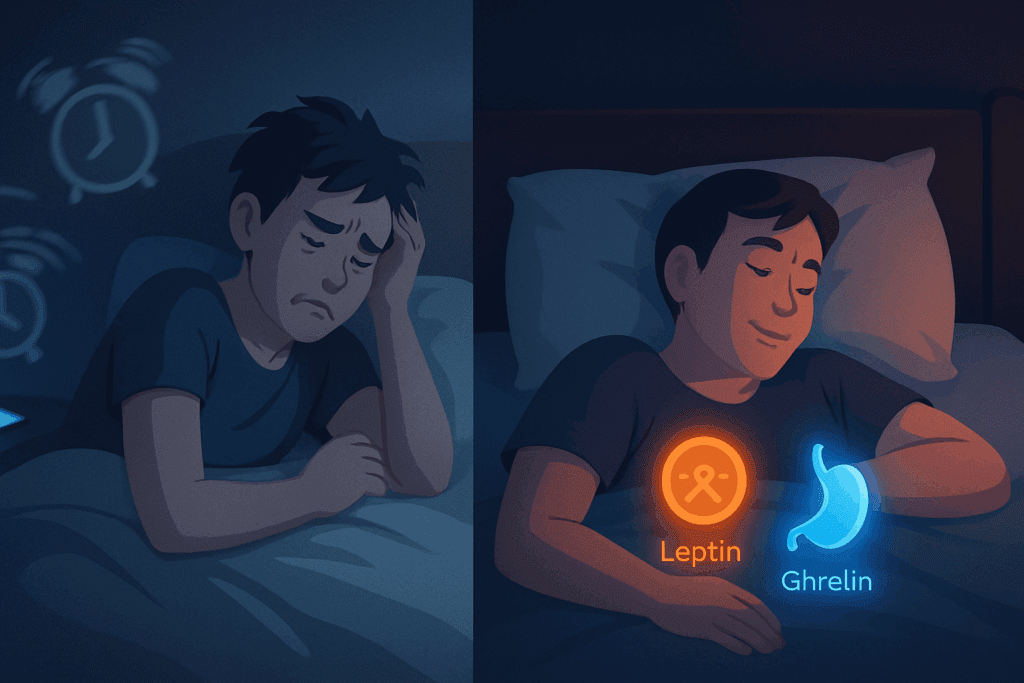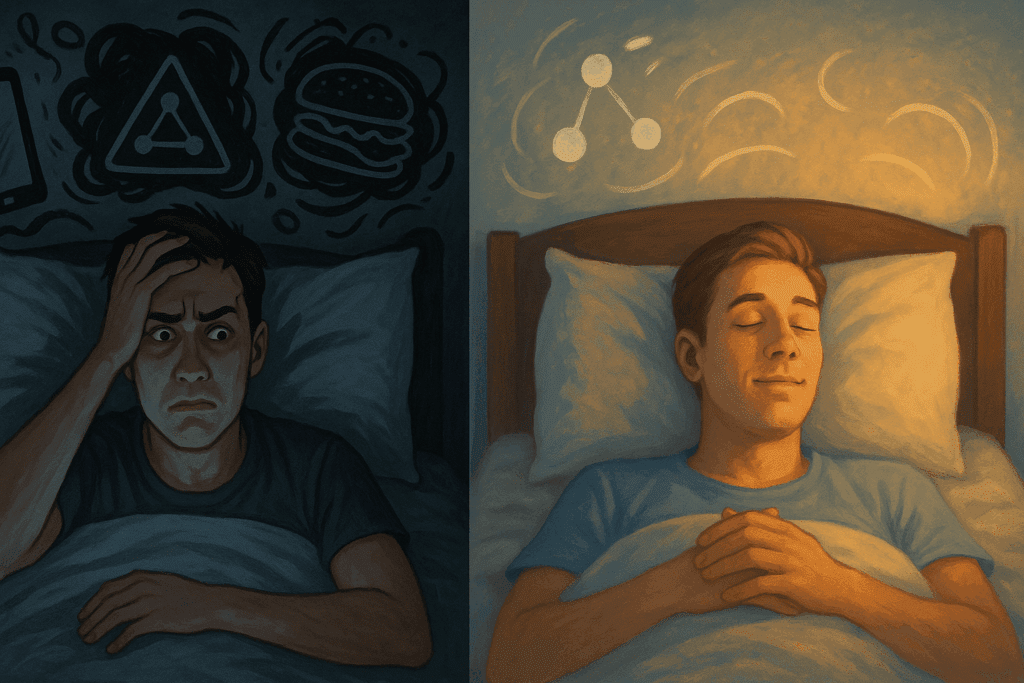The Surprising Science of Sleep and Weight Loss
At first glance, the idea of losing weight while sleeping may sound like wishful thinking or the promise of a fad diet. However, growing research in nutritional science, sleep physiology, and metabolic health reveals that the connection between quality sleep and body weight is far from superficial. It turns out that sleep is not simply a passive state of rest; it is a dynamic period during which the body carries out critical regulatory processes—many of which can influence appetite, fat metabolism, hormone balance, and even long-term weight trends.
You may also like: Expert-Backed Weight Loss Tips for a Healthier Lifestyle: What You Need to Know for Long-Term Weight Control and Wellness
Understanding how to lose weight while sleeping requires us to look beyond the superficial claims and explore the deep biological interplay between sleep architecture, calorie utilization, thermoregulation, and hormonal cascades. A restful night’s sleep is not only foundational to physical and mental well-being—it can actually become a powerful ally in supporting sustainable fat loss. In fact, numerous studies now suggest that insufficient or poor-quality sleep may be one of the hidden culprits behind weight gain and obesity, especially in populations with sedentary lifestyles or metabolic vulnerabilities.
Experts in nutrition and endocrinology continue to investigate the mechanics of overnight weight loss. While no one should expect to shed pounds at the rate promised by gimmicks, the science behind how much weight can you lose overnight is rooted in real physiological processes. By understanding the body’s overnight rhythm, individuals can make intentional lifestyle changes that enhance their weight management outcomes—without turning to extreme dieting or exhausting workouts.

What Happens to Your Body During Sleep?
Sleep is a metabolically active state. While the body appears still, the internal machinery remains in motion, working through phases of cellular repair, memory consolidation, and hormonal regulation. During non-REM deep sleep, the brain reduces its energy demands, allowing other systems—including the endocrine system—to become more dominant in guiding internal processes.
Melatonin, often associated with sleep induction, also plays a role in modulating metabolism and fat storage. Growth hormone, which peaks during the first third of the night, is instrumental in tissue repair and lipolysis—the process of breaking down stored fat for energy. Cortisol levels, which affect fat retention, begin to decline during the night but rise toward morning to prepare the body for wakefulness and glucose mobilization.
Thermogenesis, or heat production, also fluctuates overnight. As the body cools down, metabolic processes adapt, subtly affecting calorie burn. Some research estimates that individuals can burn between 300–500 calories overnight simply through basic metabolic functions, though this varies depending on age, body composition, and sleep quality.
Therefore, it’s fair to say that you can lose weight while sleeping—not necessarily in dramatic amounts, but in physiologically meaningful ways. In fact, when examining how much weight do you lose overnight after exercise, the body’s restorative sleep phase becomes even more critical. Muscle repair and protein synthesis increase, fat metabolism accelerates, and the body’s hydration levels shift due to sweat loss and respiratory moisture—contributing to subtle overnight weight fluctuations.

How Much Weight Can You Lose Overnight and What Does It Mean?
One of the most commonly searched questions online is: how much weight can you lose overnight? The answer is more complex than the number on the scale might suggest. On average, a person may see a decrease of 1 to 3 pounds between bedtime and waking, but this weight loss is largely due to water loss rather than fat reduction. The body naturally sheds water through breathing, sweating, and urine production, particularly during longer periods of uninterrupted rest.
This weight fluctuation is completely normal and should not be confused with fat loss. However, it becomes part of a broader weight loss strategy when combined with behaviors that enhance fat oxidation overnight—such as post-exercise recovery, hormonal balance, and proper nutritional timing. Understanding how much weight you lose overnight after exercise helps contextualize these changes. Exercise boosts metabolism and increases excess post-exercise oxygen consumption (EPOC), which persists for hours after activity and slightly elevates nighttime energy expenditure.
Yet, while hydration shifts and glycogen usage contribute to transient losses, the real potential lies in training the body to become metabolically flexible during sleep. The more efficiently your body burns fat overnight—particularly through healthy sleep hygiene and nutritional optimization—the more likely it is that overnight weight loss becomes part of a sustainable long-term plan.

Sleep Quality and Its Role in Metabolism and Appetite Regulation
To understand how to lose weight overnight in a medically meaningful way, we must turn our attention to the quality of sleep rather than just its duration. Research consistently shows that fragmented, insufficient, or disrupted sleep impairs glucose tolerance, increases insulin resistance, and triggers hormonal imbalances that affect appetite control.
Specifically, poor sleep is associated with elevated ghrelin levels—the hormone responsible for stimulating hunger—and suppressed leptin levels, which regulate satiety. This hormonal imbalance leads to increased cravings, particularly for calorie-dense, carbohydrate-rich foods. As a result, people who consistently sleep fewer than six hours a night are more likely to overeat and store fat, particularly around the abdomen.
Moreover, poor sleep can disrupt circadian rhythms, which are intricately tied to metabolic functions. These rhythms regulate everything from the timing of digestion to the sensitivity of insulin. When disrupted—such as in shift workers or those with irregular sleep patterns—there is a greater likelihood of weight gain and metabolic syndrome.
Experts agree that one of the simplest and most powerful strategies for how to lose weight while sleeping is to improve sleep quality. Going to bed at a consistent hour, avoiding screens before bed, and sleeping in a cool, dark environment can dramatically enhance REM and deep sleep stages—both of which are essential for optimal fat metabolism and endocrine regulation.
Can You Really Lose Fat While You Sleep? What the Evidence Shows
While most of the weight lost overnight is water weight, it is possible to burn fat during sleep under the right conditions. During prolonged fasting intervals, such as the overnight fasting period between dinner and breakfast, the body gradually shifts from burning glucose to burning fat. This transition is enhanced when glycogen stores are low, such as after moderate-intensity evening exercise or a light, protein-rich dinner.
In this metabolic state, fat oxidation increases. That’s why many fitness professionals advocate exercising in the late afternoon or evening—not only does this boost metabolism immediately, but it also creates the optimal conditions for fat burning to continue into the night. Understanding how much weight do you lose overnight after exercise provides key insights into how timing physical activity can enhance overnight recovery and weight management.
Furthermore, some studies show that people who practice time-restricted eating, such as avoiding food after 7 or 8 p.m., experience better metabolic outcomes and fat loss even without changes in total calorie intake. This supports the growing scientific consensus that the timing of food consumption affects the body’s ability to use fuel effectively—especially during sleep.
So, while you won’t wake up with visible abs after a single night of great sleep, you are laying the foundation for more efficient fat loss when the body’s metabolic conditions are optimized. This is not just hopeful thinking—it’s a strategy increasingly supported by metabolic research.

The Role of Exercise in Enhancing Overnight Fat Loss
One of the most effective ways to support fat burning during sleep is by engaging in regular physical activity. Specifically, resistance training and aerobic workouts both create a physiological environment in which the body continues to burn calories long after the exercise ends—a process known as excess post-exercise oxygen consumption (EPOC). This process can persist for several hours and, in some cases, extend into the early stages of sleep.
When examining how much weight you lose overnight after exercise, EPOC plays a central role. High-intensity interval training (HIIT), in particular, is known to increase EPOC significantly. Studies have shown that individuals who perform HIIT workouts not only burn more calories during the workout itself but also experience greater fat oxidation during sleep.
Additionally, evening workouts may help improve sleep quality, as long as they are not too intense or too close to bedtime. Better sleep contributes to better hormone regulation, which in turn enhances appetite control and glucose metabolism. In this way, regular physical activity becomes a powerful tool for reinforcing the weight loss benefits of healthy sleep.
It’s important to note that the key is not just in exercising but in understanding how to integrate it into a broader lifestyle pattern. Exercise timing, intensity, and recovery all matter—and aligning these factors with your sleep schedule can help optimize overnight fat metabolism.

Nighttime Nutrition Strategies That Support Weight Loss During Sleep
Nutrition plays an integral role in how the body functions during rest. What and when you eat has a direct impact on metabolic rate, hormonal signals, and fat-burning capacity while sleeping. Contrary to popular belief, eating at night is not inherently harmful—what matters more is the type and timing of the foods consumed.
Experts recommend avoiding large meals and sugary snacks late at night, as these can spike insulin levels and interfere with the body’s transition into a fat-burning state. Instead, a light, protein-rich snack such as Greek yogurt, cottage cheese, or a small serving of casein protein can actually support overnight recovery and muscle preservation without significantly impacting blood sugar.
Time-restricted eating or intermittent fasting, where food is consumed within an 8–12 hour window during the day, has been associated with improved sleep and better weight outcomes. This approach helps reinforce circadian alignment and allows the body to shift more efficiently into fat-burning mode during overnight fasting periods.
Hydration also plays a subtle but important role. While drinking water before bed should be balanced to avoid frequent nighttime urination, mild dehydration can slow metabolism. Drinking enough throughout the day supports natural detoxification and prevents unnecessary water retention, contributing to healthier morning weigh-ins.

Can You Lose Weight While Sleeping If You’re Stressed or Sleep-Deprived?
Chronic stress and sleep deprivation are two of the most overlooked barriers to weight loss. Cortisol, the body’s primary stress hormone, has a profound impact on fat storage, especially in the abdominal area. When cortisol remains elevated due to poor sleep, emotional stress, or metabolic disruption, the body is more likely to hold on to fat stores as a protective mechanism.
Sleep deprivation not only worsens cortisol regulation but also impairs insulin sensitivity and increases inflammatory markers—all of which make it harder to lose weight. In fact, several large-scale studies have found that individuals who sleep fewer than six hours per night have a significantly higher risk of obesity, regardless of diet and exercise.
This is where understanding how to lose weight overnight becomes less about gimmicks and more about managing the root causes of metabolic dysfunction. Incorporating mindfulness techniques, creating a relaxing bedtime routine, and minimizing screen exposure can all help reduce cortisol levels and improve sleep quality. When stress is reduced and sleep is prioritized, the body becomes more responsive to weight loss strategies.
The link between emotional health and metabolic health cannot be overstated. A well-regulated stress response is essential for maintaining a healthy body composition—and supporting overnight fat loss in a realistic and sustainable way.
What Experts Say About How to Lose Weight While Sleeping
Leading sleep researchers and metabolic health experts agree that while sleep alone won’t lead to dramatic weight loss, it is an essential piece of the broader health equation. According to the National Sleep Foundation, adults should aim for 7–9 hours of high-quality sleep each night to support optimal metabolic function and weight regulation.
Dr. Matthew Walker, a renowned neuroscientist and author of Why We Sleep, emphasizes that sleep is one of the most effective natural performance enhancers available—affecting everything from energy regulation to fat storage. When combined with consistent exercise, proper nutrition, and stress management, healthy sleep creates a hormonal environment in which the body is primed for sustainable weight loss.
Experts also caution against oversimplifying the concept of how much weight can you lose overnight. While short-term fluctuations can be motivating, lasting results come from gradual fat reduction over time. Sleep acts as the amplifier of other healthy behaviors, not as a magic bullet.
In this context, the phrase “how to lose weight while sleeping” becomes less about passive miracles and more about intentional lifestyle alignment. Small but consistent changes—like prioritizing bedtime routines, eating earlier in the evening, exercising strategically, and managing stress—compound over weeks and months to produce measurable results.
FAQ: How to Lose Weight While Sleeping — Expert Answers to Your Most Pressing Questions
1. Does sleep position affect how much weight you can lose overnight?
While your sleep position doesn’t directly impact how much weight you can lose overnight in terms of fat burning, it can influence your sleep quality—and that matters more than people realize. For example, sleeping on your back may reduce the likelihood of acid reflux and promote deeper sleep cycles, while certain side positions may support respiratory function. High-quality sleep is essential for hormone regulation, including the balance of leptin and ghrelin, which influence fat storage and appetite. So, while your position won’t cause you to burn more calories, anything that enhances deep, uninterrupted sleep could indirectly help your body function more efficiently overnight. Ultimately, how to lose weight while sleeping depends more on consistent sleep hygiene than on your physical position in bed.
2. Is it better to sleep in a cold room if you’re trying to lose weight overnight?
Yes, sleeping in a cooler environment may support metabolic activity and improve how much weight you can lose overnight through increased brown fat activation. Brown adipose tissue, or brown fat, is metabolically active and generates heat by burning calories—especially in cooler temperatures. Studies suggest that when people sleep in rooms around 66°F (18.9°C), their bodies increase thermogenesis, which can subtly increase calorie burn overnight. This doesn’t mean cold sleep alone will make a large dent in body fat, but it could enhance the effects of other healthy habits. If you’re exploring how to lose weight overnight without additional exercise, optimizing room temperature may offer a modest but meaningful metabolic advantage.
3. How much weight do you lose overnight after exercise compared to rest days?
If you’ve exercised the evening before, especially with strength training or interval workouts, you may notice a larger drop on the scale the next morning—but most of this change still reflects water loss. However, understanding how much weight you lose overnight after exercise involves more than just water. Your body continues burning calories through excess post-exercise oxygen consumption (EPOC), which is heightened after intense or resistance workouts. This elevated metabolism can persist into your sleeping hours, increasing fat oxidation compared to sedentary days. In practice, this means combining physical activity with restful sleep creates the most favorable conditions for how to lose weight while sleeping in a sustainable, science-backed way.
4. Can tracking sleep improve your weight loss results overnight?
Absolutely—tracking your sleep with wearable devices or smart apps can give you valuable insights into how sleep affects your metabolism. Many fitness trackers now monitor not just duration but sleep stages, heart rate variability, and nighttime calorie burn. This data can help you understand whether your efforts to improve how to lose weight overnight are working or if poor sleep habits are undermining your progress. For example, you might discover that late meals disrupt your REM cycles or that alcohol reduces your deep sleep, both of which can impair overnight fat metabolism. For individuals focused on how much weight can you lose overnight with better habits, feedback from sleep tech can be a powerful behavioral tool.
5. Do certain nighttime supplements support overnight fat loss?
While no supplement is a magic bullet, some evidence suggests that specific nighttime supplements may support metabolic processes during sleep. Ingredients like magnesium, glycine, L-theanine, and melatonin can improve sleep quality, which indirectly supports fat regulation. Some formulations also include low doses of green tea extract or forskolin, which may enhance nighttime thermogenesis without overstimulation. It’s important to consult a physician before using any supplement, especially if you have underlying health conditions. However, for those wondering how to lose weight while sleeping naturally and safely, a science-backed, gentle supplement regimen might complement other strategies when used responsibly.
6. Is it possible to gain weight even if you sleep well?
Yes, and this is where context is crucial. While learning how to lose weight while sleeping can offer meaningful health benefits, no single factor determines weight status. You can sleep soundly every night and still gain weight if you consistently consume more calories than you burn, if your macronutrient balance is poor, or if your physical activity levels are low. Sleep is one component of a metabolic system influenced by genetics, diet, hormonal balance, and environmental stressors. Even the best sleep hygiene won’t override chronic overnutrition or inactivity. Still, sleep remains an indispensable part of the equation—especially when considering how much weight do you lose overnight after exercise versus nights without movement.
7. Can sleep deprivation reverse overnight fat loss progress?
Yes—sleep deprivation can sabotage metabolic health, even if you’re doing everything else right. When you’re sleep-deprived, the body enters a stress response state, increasing cortisol and reducing insulin sensitivity, both of which make fat loss more difficult. This hormonal imbalance not only reduces how much weight you can lose overnight but may also increase your appetite the next day, often leading to overeating. One study showed that people who slept less than five hours consumed up to 385 extra calories the next day compared to those who slept well. So, if your goal is to learn how to lose weight overnight effectively and maintain progress, adequate sleep is non-negotiable.
8. Do women and men lose the same amount of weight overnight?
Biologically, men and women may experience different overnight weight changes due to differences in muscle mass, hormone profiles, and water retention patterns. Men, on average, have higher basal metabolic rates (BMR) due to greater lean body mass, which means they may burn more calories during sleep. Women, on the other hand, may retain more water depending on their menstrual cycle, which can obscure how much weight can you lose overnight on any given day. Additionally, estrogen and progesterone fluctuations influence thermoregulation and fat storage. This means that strategies for how to lose weight while sleeping might need to be customized based on gender, hormonal cycles, and individual metabolic differences.
9. Is it safe to follow fasting protocols that extend through sleep for weight loss?
Time-restricted eating (TRE), particularly when aligned with natural circadian rhythms, can be a safe and effective strategy to support overnight fat burning. For example, finishing dinner by 7 p.m. and not eating until 9 a.m. the next day creates a 14-hour fast, allowing your body to shift into fat metabolism during the night. This fasting window supports those curious about how to lose weight overnight without extreme dieting. However, it’s important to ensure that daily nutrition remains adequate—especially protein and micronutrients—to prevent muscle loss. For individuals with diabetes, hypoglycemia, or other conditions, any fasting protocol should be supervised by a healthcare provider.
10. What future innovations might enhance weight loss during sleep?
Emerging research in chrononutrition and metabolic sleep science is opening doors to new innovations that could enhance how to lose weight while sleeping. Scientists are exploring ways to optimize metabolism through tailored lighting, temperature-controlled bedding, and even personalized sleep nutrition plans that synchronize with your genetic chronotype. We may also see advancements in wearable tech that not only monitor but also actively adjust sleep conditions in real time to boost fat oxidation. Pharmaceutical development is another area of interest, with compounds that target sleep-phase metabolism without compromising circadian health. As our understanding deepens, the future of how much weight you can lose overnight may look very different—and much more personalized—than it does today.
The Bottom Line: Realistic Expectations and Sustainable Results
In the pursuit of better health, sleep is often the forgotten pillar—overshadowed by diet plans and exercise regimens. But when viewed through the lens of hormonal balance, metabolism, and overnight recovery, it becomes clear that sleep is one of the most powerful tools available for supporting weight loss and overall wellness.
Understanding how much weight you lose overnight after exercise, or how to lose weight overnight without extreme effort, requires a shift in mindset. It’s not about shortcuts or exaggerated promises—it’s about optimizing the conditions under which the body functions best. Weight loss during sleep may not be dramatic in a single night, but it is meaningful over time, especially when anchored by scientifically supported strategies.
So, can you lose weight while sleeping? The answer is yes—but only when sleep is paired with intentional lifestyle choices. The journey to a healthier body doesn’t pause when your eyes close. In fact, it might just be starting. Prioritizing deep, restorative sleep may be the missing link in your weight loss strategy—a quiet ally working behind the scenes every night to support your goals.
Further Reading:
12 daily habits that will help you lose weight while you sleep


